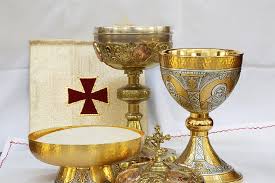How To Make A “Spiritual Communion”
Fr. Wade L. J. Menezes, CPM
Fathers of Mercy
St. Alphonsus Liguori (Bishop and Doctor of the Church, b. 1696 – d. 1787) recommends making a “Spiritual Communion” by carrying out the following three simple steps with great faith and fervor:
- Make an act of faith in the Real Presence of Jesus Christ truly present in the Most Blessed Sacrament – the Most Holy Eucharist – in His Body, Blood, Soul and Divinity.
- Make an act of desire, accompanied by an act of sorrow for one’s sins (mortal and venial, whether past or present), so as to worthily receive these graces as if one were receiving actual Sacramental Eucharistic Communion.
- Make an act of thanksgiving afterward, as if you received Jesus Sacramentally in the Most Holy Eucharist.
Note: All three of these steps may be combined into one prayer.
Example Of A “Spiritual Communion” Prayer
+ My Lord, Jesus Christ, although I greatly desire it at this moment, I am not able to receive You Sacramentally in the Most Holy Eucharist. I believe, O Jesus, that You are really, truly and substantially present in the Most Blessed Sacrament of the Altar – the Holy Eucharist – in Your Body, Blood, Soul and Divinity. I am truly sorry for all of my sins – mortal and venial, past and present. I ask of You, O Lord, through this Spiritual Communion, to bestow upon me all of those graces that I would otherwise receive as if I did actually receive You in Holy Communion. I desire Your sanctifying and actual graces to the full, even until I am overflowing with them, so that I may, in turn, share these same graces with the rest of the world. Amen. +
Side Notes
- Side Note 1: Ideally, a “Spiritual Communion” should regularly precede even a Sacramental Communion. As Fr. John Hardon’s Modern Catholic Dictionary (p. 116) teaches us, a Spiritual Communion is “The conscious desire to receive Holy Communion, which should precede the actual reception of the Sacrament (of the Eucharist). Spiritual Communion, made in acts of faith and love during the day, is highly recommended by the Church. According to the Catechism of the Council of Trent, the faithful who ‘receive the Eucharist in spirit’ are ‘those who, inflamed with a lively faith that works in charity, partake in wish and desire of the celestial Bread offered to them, (and) receive from it, if not the entire, at least very great benefits’” (Council of Trent: On the Eucharist).
- Side Note 2: Important, too, is to remember to make an Act of Contrition before your Spiritual Communion, just as you would do before receiving Sacramental Eucharistic Communion. Regarding contrition, it is worth mentioning, here, the distinction between perfect contrition and imperfect contrition (also called attrition): Perfect contrition is when you are sorry for your sins most of all because they have offended God, Who is all good and deserving of all your love (as one version of the Act of Contrition states). But if you are sorry for your sins and detest them only for human motives — for example, because you dread the loss of Heaven and the pains of Hell, or because you’ve been asked to be a Godparent and the rules require you to be in good standing with the Church — this would be imperfect contrition (attrition). The great news, however, is that Holy Mother Church considers even imperfect contrition (that is, a fear of divine justice, even if mixed with human motives) to be a sufficient basis for sorrow for the Sacrament of Confession (see Catechism of the Catholic Church, 1451–1453).
